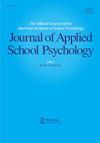在常规条件下实现的基于模式的指令
IF 1.5
Q4 PSYCHOLOGY, EDUCATIONAL
引用次数: 4
摘要
许多有特殊学习障碍(SLD)的学生在解决数学问题方面存在困难。基于模式的教学(SBI)被认为是一种很有前途的SLD学生实践。目前的项目旨在测试教师在常规条件下实施SBI的效果。这扩展了先前的文献:(a)使用教师作为实施者,(b)允许干预协议的灵活性,(c)缩短干预会议的持续时间,以及(d)在小组环境中提供指导。此外,我们还测量了学生在需要两个步骤的文字问题上的解决表现。我们在三组五年级参与者(n = 7)中采用了多探针设计,在资源室设置中接受补充指导。结果表明,SBI与单步字题解题成绩之间存在函数关系。然而,参与者在表现上的变化幅度和一致性各不相同。学生在一个结构和组合结构中嵌入的两步字谜问题上的表现较低。使用NAP、Tau、LRRi和BC-SMD效应量来量化效果。讨论了可能影响保真度的系统复制和条件的含义。本文章由计算机程序翻译,如有差异,请以英文原文为准。
Schema-Based Instruction Implemented under Routine Conditions
Abstract Many students identified with a specific learning disability (SLD) experience difficulty with mathematical problem solving. Schema-based instruction (SBI) is identified as a promising practice for students with a SLD. The current projects aimed to tests the efficacy of SBI implemented by a teacher under routine conditions. This extends prior literature by (a) using a teacher as the implementer, (b) allowing flexibility in the intervention protocol, (c) condensing the duration of intervention sessions, and (d) providing instruction in small group settings. In addition, we measured student problem solving performance on word problems requiring two-steps. We used a multiple-probe design across three groups of fifth-grade participants (n = 7) receiving supplemental instruction in a resource room setting. Results indicated a functional relation between SBI and problem-solving performance on one-step word problems. However, the magnitude of change and consistency in performance varied across participants. Student performance on two-step word problems embedded within one structure and combined structures was low. The NAP, Tau, LRRi, and BC-SMD effect sizes were used to quantify effects. Implications are discussed in regard to systematic replication and conditions that may impact fidelity.
求助全文
通过发布文献求助,成功后即可免费获取论文全文。
去求助
来源期刊

Journal of Applied School Psychology
PSYCHOLOGY, EDUCATIONAL-
CiteScore
2.40
自引率
10.00%
发文量
7
期刊介绍:
With a new publisher (Taylor & Francis) and a new editor (David L. Wodrich), the Journal of Applied School Psychology will continue to publish articles and periodic thematic issues in 2009. Each submission should rest on either solid theoretical or empirical support and provide information that can be used in applied school settings, related educational systems, or community locations in which practitioners work. Manuscripts appropriate for publication in the journal will reflect psychological applications that pertain to individual students, groups of students, teachers, parents, and administrators. The journal also seeks, over time, novel and creative ways in which to disseminate information about practically sound and empirically supported school psychology practice.
 求助内容:
求助内容: 应助结果提醒方式:
应助结果提醒方式:


